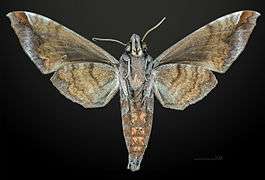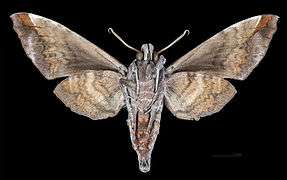Acosmeryx shervillii
| Dull forest hawkmoth | |
|---|---|
.jpg) | |
| Scientific classification | |
| Kingdom: | Animalia |
| Phylum: | Arthropoda |
| Class: | Insecta |
| Order: | Lepidoptera |
| Family: | Sphingidae |
| Genus: | Acosmeryx |
| Species: | A. shervillii |
| Binomial name | |
| Acosmeryx shervillii Boisduval, [1875][1] | |
| Synonyms | |
| |
Acosmeryx shervillii (dull forest hawkmoth) is a moth of the family Sphingidae. It is found from the Indian subregion of India, Sri Lanka, to Sundaland, the Philippines and Sulawesi.[2] Acosmeryx pseudonaga is sometimes treated as a valid species.
Description
The different color varieties of the species has subjected to many taxonomic revisions in many times. However, they are classified as color morphs of the single species A. shervillii.
According to the The Fauna Of British India Including Ceylon And Burma Moths Vol-1 by G. F. Hampson described the species as follows:
"Greyish brown; the vertex of head dark; pro-, meso-, and meta- thorax each with a dark transverse streak; dorso-lateral oblique dark stripes on each segment of the abdomen. Fore wing with nine curved and waved antemedial dark lines, the interspaces between three of the pairs of lines being filled in with dark brown, so as to form one subbasal and two antemedial bands; a dark-ringed pale speck at end of cell, the pale center being sometimes obsolete; four postmedial curved lines; an oblique dark band from beyond the middle of the costa to outer angle, in some of the forms produced outwards along vein 5 so as to be more oblique; a pale submarginal obsolescent line from below the apex to outer angle, sometimes carried out to the margin at vein 4. Hind wing brownish fuscous, with traces of a pale patch and dark lines near anal angle. Underside more or less suffused with ferruginous, ochreous, and grey; the outer margin of both wings dark; hind wing with five indistinct lines.......larva green; a series of brown dorsal spots and of lateral oblique stripes on 5th to 10th somites; an ocellated spot on 4th somite; a black stripe from 1st to 4th somite, with a yellow line above it; horn brown."
—The Fauna Of British India Including Ceylon And Burma Moths Vol-1.[3]
Biology
There are three or more generations in Hong Kong, occurring from early March until early October. The larvae have been recorded on Saurauia, Dillenia, Leea, Cayratia, Cissus and Vitis species.[4]
-

♂
-

♂ △
-

♀
-

♀ △
References
- ↑ "CATE Creating a Taxonomic eScience - Sphingidae". Cate-sphingidae.org. Archived from the original on 2012-11-08. Retrieved 2011-10-20.
- ↑ "Acosmeryx shervillii Boisduval sp. rev.". The Moths of Borneo. Retrieved 5 July 2016.
- ↑ Hampson G. F. (1892). "The Fauna Of British India Including Ceylon And Burma Moths Vol-i". Digital Library of India. p. 558. Retrieved 4 July 2016.
- ↑ Pittaway, A.R. & Kitching, I.J. "Dull forest hawkmoth". Sphingidae of the Eastern Palaearctic species list. Retrieved 5 July 2016.
External links
| Wikimedia Commons has media related to Acosmeryx shervillii. |